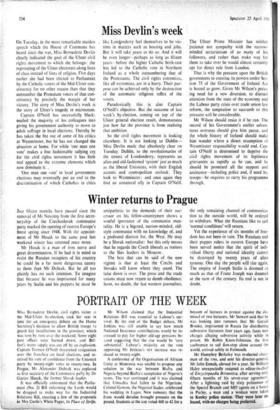Miss Devlin's week
On Tuesday, in the most remarkable maiden speech which the House of Commons has heard since the war, Miss Bernadette Devlin clearly indicated the goal of the Ulster civil rights movement to which she belongs: the regrouping of the Ulster electorate along lines of class instead of lines of religion. Five days earlier she had been elected to Parliament by the Catholic voters of the Mid-Ulster con- stituency for no other reason than that they outnumber the Protestant voters of that con- stituency by precisely the margin of her victory. The story of Miss Devlin's week is the story of Ulster's tragedy in microcosm.
Captain O'Neill has successfully black- mailed the majority of his colleagues into giving his government authority to move to adult suffrage in local elections. Thereby he has taken the fire .out of some of his critics at Westminster, but he has not changed the situation at home. For while 'one man one vote' makes a fine fashionable rallying cry, for the civil rights movement it has little real appeal to the extreme elements which now dominate it. _ 'One man one vote' in local government elections may eventually put an end to the discrimination of which Catholics in cities like Londonderry feel themselves to be vic- tims in matters such as housing and jobs. But it will take years to do so. And it will be even longer—perhaps as long as fifteen years—before the higher Catholic birth-rate has led to the Catholic vote in Northern Ireland as a whole outnumbering that of the Protestants. The civil rights extremists, like all extremists, are in a hurry. Their pur- pose can be achieved only by the destruction of the automatic religious reflex of the voters.
Paradoxically this is also Captain O'Neill's objective. But the outcome of last week's by-election, coining on top of the Ulster general election result, demonstrates just how far the province is from realising that ambition.
So the civil rights movement is looking elsewhere. It is not looking to Dublin— Miss Devlin made that absolutely clear on Tuesday. Dublin, to the revolutionaries of the streets of Londonderry, represents an alien and old-fashioned 'system' just as much as the liberal Unionists, with their English accents and cosmopolitan outlook. They look to Westminster: and once again they find an unnatural ally in Captain O'Neill. The Ulster Prime Minister has neither patience nor sympathy with the narrow- minded sectarianism of so many of his followers, and rather than make way for them to take over he would almost certainly opt for direct rule from London.
That is why the pressure upon the British government to exercise its powers under Sec- tion 75 of the Government of Ireland Act is bound to grow. Given Mr Wilson's press- ing need for a new. diversion, to distract attention from the state of the economy and the Labour party crisis over trade union law reform, the temptation to succumb to this pressure will be considerable.
Mr Wilson should resist it if he can.- The record of his Government's earlier adven- tures overseas should give him pause, and the whole history of Ireland should- make him wonder where a direct resumption of Westminster responsibility would end. Cap- tain O'Neill is determined to deprive the civil rights movement of its legitimate grievances as rapidly as he can, and he should be promised all the support and assistance—including police and, if need be, troops—he requires to carry his programme through.










































 Previous page
Previous page